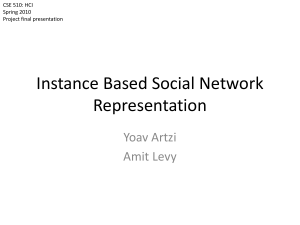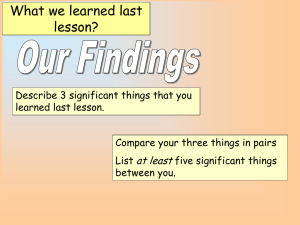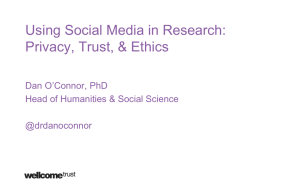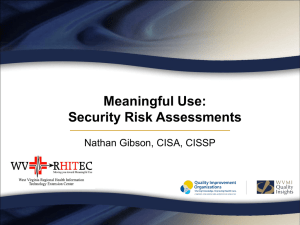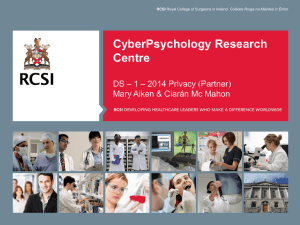Data Analytics, Privacy, Security and HIPPA
advertisement
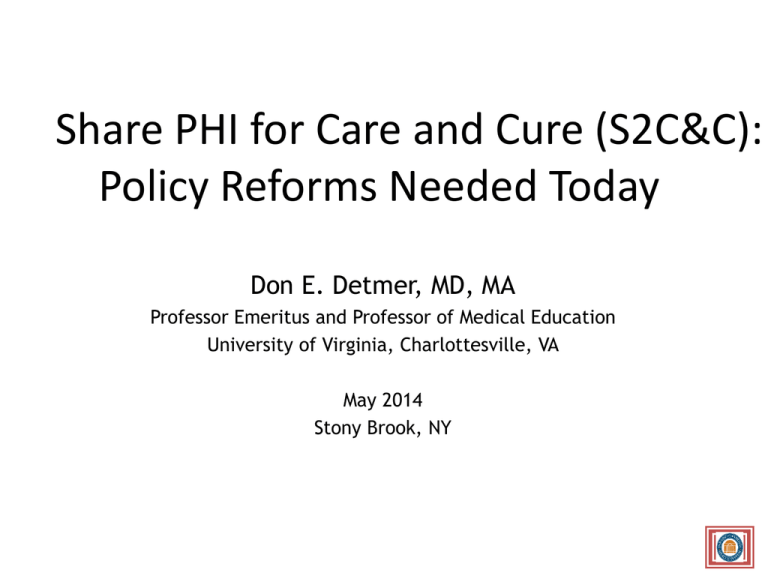
Share PHI for Care and Cure (S2C&C): Policy Reforms Needed Today Don E. Detmer, MD, MA Professor Emeritus and Professor of Medical Education University of Virginia, Charlottesville, VA May 2014 Stony Brook, NY Personal Declared Interests* University of Virginia AMIA American College of Surgeons CHIME, University College London NIH Clinical Translational Science Award National Advisory Group: U Minnesota Board, Corporation for National Research Initiatives *Views expressed today are personal. Federal & State Policy & Regulations must support efficient, secure sharing of personal health information (PHI) for care, quality, safety, & research. Today, they don’t! Policy making in democracies involves striking a balance among competing social goods & other desires that are in dynamic conflict. Examples of these forces: Equity, Greed, Health, Learning, Liberty, Opportunity, Privacy, Security, Trust, Love, Charity, Duty, Patriotism, Citizenship, Responsibility Due to these inherent conflicts, enduring values in cultures are not to be assumed.* *Allcott H and Mullainathan S: Behavior & Energy Policy. Science 2010, 327:1204-5. The Share to Care & Cure (S2C&C) Initiative seeks Federal & State Health Policy Reforms to greatly advance biomedical & health services research for care & cures. The views expressed here do not represent formal positions of the organizations or institutions of the Share to Care & Cure (S2C&C) Work Group membership. The Share to Care & Cure (S2C&C) Initiative team* includes: Health Professional Groups Academic Researchers Health & IT Company Representatives Health Policy Experts *S2C&C began as an independent group following the AMIA Health Policy meeting of 2012 HIPAA (Health information Portability and Accountability Act of 1997) Part of Administrative Simplification Provisions to protect Personal Health Information (PHI) • Pre-internet • Pre-Big Data and Data Analytics • Era of Clinical Trials & Informed Consent Access to unanonymized data for care, quality, and business applications; Access to PHI for public health --------- *S2C&C began as an independent group after the 2012 AMIA Health Policy meeting; Detmer met with E&C, Ways & Means, Senate HELP Staff in 2013 S2C&C Policy Goals (6) 1 – Allow secure use of complete patient health data for biomedical & health research w/ citizen opt-out 2 - Enact a unique personal health identifier solely for research use to support best authentication 3 - Amend HIPAA & subsequent regulations to: - treat research like quality, care, & business apps - allow clinicians judgment to share patient’s PHI with family - allow clergy access to their hospitalized congregants 4 - Rescind select identified FDA policies that raise research costs w/o demonstrable public benefit 5- Assure Public Transparency on Responsible Research Data Uses & Breaches 6- Rescind state privacy related laws for Federal rules only (e.g., copy Hawaii) * * Waldo: see http://radar.oreilly.com/2012/08/hawaii-health-care-law-simplicity.html Secure Unanonymized Data Access for Health & Research today should be a national imperative. Why? • National Debt & Health Care costs unsustainable. • Jobs needed; health research creates great jobs. • Biomedical research costs keep rising, budgets tighten & good ideas go unexplored. • Rising research strictures discourage young scholars. • Baby boomers want & will need cures. • Mostly, today’s biomedical research works! Example: EU recently have enacted policies that researchers are convinced will limit research significantly.* Science 2014 • It passed despite the warning. A people who would govern themselves must arm themselves with the power to which knowledge gives. - James Madison, 1822 Author of U.S. Constitution Rep. Fred Upton Help on the Way! Energy & Commerce Cures A path to 21st century cures Rep. Diana DeGette Mission In the 21st century, health care innovation is happening at lightning speed. From the mapping of the human genome to the rise of personalized medicines that are linked to advances in molecular medicine, we have seen constant breakthroughs that are changing the face of disease treatment, management, and cures. Health research is moving quickly, but the federal drug and device approval apparatus is in many ways the relic of another era. We have dedicated scientists and bold leaders at agencies like the NIH and the FDA, but when our laws don’t keep pace with innovation, we all lose. If we want to save more lives and keep this country the leader in medical innovation, we have to make sure there’s not a major gap between the science of cures and the way we regulate these therapies. That is why, for the first time ever, we in Congress are going to take a comprehensive look at what steps we can take to accelerate the pace of cures in America. We are looking at the full arc of this process – from the discovery of clues in basic science, to streamlining the drug and device development process, to unleashing the power of digital medicine and social media at the treatment delivery phase. We know we don’t have all the answers. That’s why we’re asking questions first. We are listening. We want to know how to close the gaps between advances in scientific knowledge about cures and the regulatory policies created to save more lives. Over the next serveral months, members will take a comprehensive look at the full arc of this process - from the discovery to development to delivery - to determine what steps we can take to ensure we are taking full advantage of the advances this country has made in science and technology and use these resources to keep America as the innovation capital of the world. http://energycommerce.house.gov/cures https://www.youtube.com/watch?v=nv_wyTlfUDo&feature=youtu.be Chairman Fred Upton’s First “Cures Roundtable” US Capitol - May 6 – 3 pm Tentative line up: Francis Collins, Director, National Institutes of Health; Janet Woodcock, Director, Center for Drug Evaluation and Research, FDA; Jeff Shuren, Director, Center for Device and Radiological Health, FDA; Michael Milken, Chairman, Milken Institute; James Woolliscroft, Dean, University of Michigan Medical School; Joe Gray, Associate Director for Translational Research, Knight Cancer Institute, Oregon Health and Science University; Andy von Eschenbach, former Commissioner of FDA and former Director of the National Cancer Institute; Peter Huber, Manhattan Institute; Jonathan Leff, Partner, Deerfield Management; Allan Coukell or designee, Pew Charitable Trusts Cures Needed as Never Before • Half-way technologies waste money. - Example: Imaging for the sake of imaging (RWJ, GAO) • Research finds actual cures. • Maximum progress requires large datasets. Translational Bioinformatics : Recent Lesson: Major Progress will require Major Scaling “People were overly optimistic”, Suzanne Leal (Baylor) “We’re still in the foothills, really. We need larger sample sizes,” Mark McCarthy (Oxford) Science: 23 November 2012, vol. 338 pg. 1016 Compassion & Charity: Cures due to Evidence-based Research Far fewer halfway technologies (Lewis Thomas) Th. Billroth – Gastric resection for Peptic Ulcer Barry Marshall – H. pylori Sharing Personal Data for Quicker Cures through ‘Big Data’ & Translational Bioinformatics Case Study: Gleevec for Chronic Myelogenous Leukemia • Took 20 years to identify specific gene translocation • Given current technology - Basic scientific discovery & developing a molecule: 6-12 mos. Brian Druker, MD, PhD, Oregon Sharing Personal Data for Quicker Cures through ‘Big Data’ & Translational Bioinformatics Ex. Case Study - Identifying RETSAT as an important regulator of insulin sensitivity Lazar – Global 5 year, multi-institutional study Kohane – weekend data crunching for gene most commonly dysregulated in diabetics Mitchell Lazar Zak Kohane Privacy Policy & Regulations Today • • Imbalanced & dysfunctional – • Don’t secure privacy well • Impedes medical progress Limits all biomedical & health research • Quality & Safety in clinical care • Big Data gains • Translational Research • Delivery System Analytics • Increases social inequity Learning Healthcare System Recent Lesson: “Big Data” Infrastructure essential Robust Clinical Data Capture: Data Ecosystem for Safe Quality Care, Payment, & Professional Credentialing American College of Surgeons Clinical Data Capture Initiative: NSQIP Surgical Site Infection Data Standard (National Quality Forum) automated data capture in collaboration with EPIC & other EHR vendors, Maintenance of Certification, Data Registries, etc. • • Strategies and Priorities for Information Technology at the Centers for Medicare & Medicaid Services (NRC 2012) (see nap.edu) Health IT & Patient Safety: Building Safer Systems for Better Care (IOM 2012) (see nap.edu) DED Vision: “Nested” EHRs High Value Clinical Quality/Safety/Payment Electronic Health Records with automated evolving high fidelity Data Capture of Information from EHRs - CPayR (Clinical Payment Record) Payment with fraud & abuse protections - CCR (Clinical Care Record) for Patient & Public Health Care - Continuity of Care Record as an element - CCRRs (Clinical Care Research Records) for System Analytics & Research - CPerfRs (Clinician Performance Records) for Professional Education & Accountability Today, US privacy law, regulatory structure, & federal system behavior seriously restrict flow of health data needed for a Learning Health Care System, e.g., continuous data use.* Multiple studies show all levels of health related quality improvement & research are significantly limited by current structure & practice, e.g., public health, genetics, health services (Latest example: SSN Death Records (see http://www.twincities.com/national/ci_21761687/social-security-death-recordlimits-hinder-researchers) IOM: Beyond the HIPAA Privacy Rule (2009) http://nap.edu All at http://nap.edu Also, PCAST 2010 * Penfield, Anderson, Edmund, Belanger: Toward Health Information Liquidity: Realization of Better, More Efficient Care From the Free Flow of Health Information http://www.fah.org/fahCMS/Documents/On%20The%20Record/Research/2009/Booz_Allen_Toward_Hlth_Info_Liquidity.pdf Chronic Data Use Policy Problems not getting better elsewhere... * •Uncertainties & disagreements around construct of ‘personal data’ •Debate about ethical & legal appropriateness of consent to complicated research and sharing data via research platforms •Dispute over acceptability of broad consent to unspecified, perhaps unspecifiable, future research •Lack of clarity about how to deal with privacy & confidentiality implications for relatives of people involved in research •Public & researcher apprehension about legal power of researchers to resist forcible access to research data by police, courts, etc. •Inconsistencies & redundancies in laws & regs, often out of step w/ times •Onerous, inefficient, & costly procedural requirements for complying with all the regulatory structure *William Lowrance: Privacy, Confidentiality, and Health Research, 2012, Cambridge University Press, Cambridge. Data Access for Information-based Research: Current Requirements, Barriers, & Privacy Vulnerabilities Type of Health Data Fully Identifiable Personal Current HIPAA Requirements Individual consent OR Health Information Institutional Review Board (PHI) waiver Barriers to Research/Access •Costly, burdensome, often impossible for large data sets • Requiring consent may create selection bias • IRB waiver possible but inconsistent Adapted from Douglas Peddicord (2012) Privacy Vulnerability Consent does not mean protections are adequate • Use of fully identified PHI means any breach creates exposure Data Access for Information-based Research: Current Requirements, Barriers, & Privacy Vulnerabilities Type of Health Data Limited Data Set Current HIPAA Requirements Barriers to Research • Remove 16 direct • IRBs often identifiers restrict use AND • Data Use Agreement, with prohibition of reidentification or contact of individuals • Ban on sale of PHI creates uncertainty • State-based consent requirements may pose major obstacles Adapted from Douglas Peddicord (2012) Privacy Vulnerability • Risk of inadequate data security & breach • Residual risk of re-identification remains despite Data Use Agreement prohibition Data Access for Information-based Research: Current Requirements, Barriers, & Privacy Vulnerabilities Type of Health Data De-identified Data Current HIPAA Requirements Safe Harbor Method removes 18 direct identifiers & associated data OR • Statistician Method certifies “low risk” Barriers to Research • Removal of identifiers & data elements, especially all dates, limits data utility Adapted from Douglas Peddicord (2012) Privacy Vulnerability • None proven, but there is a perception that increased computing power has rendered genuine deidentification nearly impossible (esp. with genomic data) Just how much privacy regulation can the nation justifiably afford in terms of : …people otherwise living longer, healthier lives. …less healthcare & greater inequities for the poor …lost savings resulting from much more effective, less costly health care. …lost benefits of high income research jobs. …loss of international competitiveness. …the reality that the entire world depends heavily on US research for its cures as well. Blind Drive for Greater Privacy overrides Compassion, Equity, & Healthcare for Least Fortunate • mHealth - Text messaging for appointment reminders & motivating behavior change is increasingly well-studied & evidence-based. Texting helps smoking cessation in UK (Lancet 2011) But, in Dr. Houston’s clinical system, policy doesn’t allow texting, as it is not secure. Thus, even if patients ask for and even consent to texts as reminders for visits or tailored messages for information, security officers override use regardless of how much it enhances quality. Over 85% of adults have access to a text-enabled phone, including the lowest income patients, including Homeless Veterans in the VA. Smart Phones are more secure & increasing in use but most poorer adults don’t have this technology today, e.g., the homeless patients or other highly vulnerable populations. Source: Tom Houston, MD MPH (AMIA Clinical Symposium, 2012) Professor and Chief, Division of Health Informatics and Implementation Science UMass Medical School and Director, VA eHealth Quality Enhancement Research Initiative Conclusion: Current Federal & State Health Data Structure is harmful to your health & the health of future generations • Neither protects personal data well nor offers cost-effective access to data for research. Ex. No unique personal health identifier for privacy or research to support authentication • Preferentially favors Minimum Data Sets which limits value •Incentivizes Data Collection Centers to limit access to data in order to reduce legal exposure to fines if misuse were to occur •Confusing, changing admixture of state & federal mandates •Under HIPAA, individuals prohibited from consenting to future, unspecified uses of data. Nothing is so contagious as opinion, especially on questions which, being susceptible of very different glosses, beget in the mind a distrust of itself. James Madison Letter to Dr. Rush, March 7, 1790 Privacy Vulnerability of Health Data in the Genomic Era None proven, but there is a perception that increased computing power will render genuine de-identification nearly impossible (esp. with genomic data) True, or False? Health Policy should be transparent, honest to the facts, & help instill trust through integrity. If in the genomic era, privacy of personal health data is genuinely at great risk due to progress in medical research, the health research community must square with the public & make the case that research is still in the public interest despite this vulnerability, or it will face even greater loss of public support. Thank you for your attention. detmer@virginia.edu What can health professionals do? 1. Advocate for Cure & Care objectives 2. Build on Presidential aspirations with a clear vision & Federal strategy • Executive Branch • Legislative Branch (support E&C ‘Cures’ initiative) • All relevant influential players 3. Craft state strategy, e.g., “Copy Hawaii’s 5 0” 4. Develop opinion pieces & a public campaign President Obama on 2nd Term Top Priorities & Regulatory Reform Priorities: “…taxes, health care, education, energy policy & immigration. …health care reform” Regulatory Reform “…executive action to weed out regulations that aren't contributing to the health & public safety of our people. And we've made a commitment to look back & see if there are regulations out there that aren't working, then let's get rid of them & see if we can clear out some of the underbrush on that. Again, that's something that should be non-ideological. - Des Moines Register Interview – October 2012 REPORT TO THE PRESIDENT Transformation and Opportunity: The Future of the U.S. Research Enterprise NOVEMBER 2012 Executive Office of the President President’s Council of Advisors on Science and Technology Action #2.1. The Federal Government should identify and achieve regulatory policy reforms, particularly relating to the regulatory burdens on research universities. Patient Advocacy Groups, AAAS, Researchers, AMIA & Others should advocate for Federal Policy Reform Proposed Campaign Slogan: Hope & Life come from Medical Research: Share Your Health Data, Not Your Privacy Fears We need a federal action to assure cures! See Detmer DE: Activating a Full Architectural Model: Improving Health through robust Population Health Records. JAMIA 2010: 17:367-369. Most Critical Issues to US Population regarding personal health data sharing* Arthur Levin Director, Center for Medical Consumers, NYC 1) Totally transparent program management, e.g., all processes available on Website including those relating to opting out 2) Published Audits of Researchers who access data 3) Published Audits of any wrongful disclosures 4) Focus groups used prior to going live *Levin estimates few opt-outs if supported by public education, patient advocacy groups & health professions “You cannot put an idea into someone’s head. Media’s job is to touch what is already there.” - Tony Schwartz PR Example 1 : Data Sharing for Biomedical Research: Which will be the American Spirit for 2014-2020? Privacy ? or Cures ? PR Ex.2 “Hummmm. Facebook just hit 1+ billion. Meanwhile, the government won’t let me get complete health data to cure sick children. Why must even one more die unnecessarily?” Patriotism: The Big Data Message • Cures can occur & the national health budget can be impacted by reducing ‘halfway technologies’ . • Cures will come sooner if more personal health data is securely but easily accessible to researchers • Today, progress in health research is tied directly to sharing large sets of personal health data, e.g., cleaner, authenticated data • Compassion necessitates greater secure access to personal health data. S2C&C Policy Goals (6) 1 – Allow secure use of complete patient health data for biomedical & health research w/ citizen opt-out 2 - Enact a unique personal health identifier solely for research use to support best authentication 3 - Amend HIPAA & subsequent regulations to: - treat research like quality, care, & business apps - allow clinicians judgment to share patient’s PHI with family - allow clergy access to their hospitalized congregants 4 - Rescind select identified FDA policies that raise research costs w/o demonstrable public benefit 5- Assure Public Transparency on Responsible Research Data Uses & Breaches 6- Rescind state privacy related laws for Federal rules only (e.g., copy Hawaii) * * Waldo: see http://radar.oreilly.com/2012/08/hawaii-health-care-law-simplicity.html




